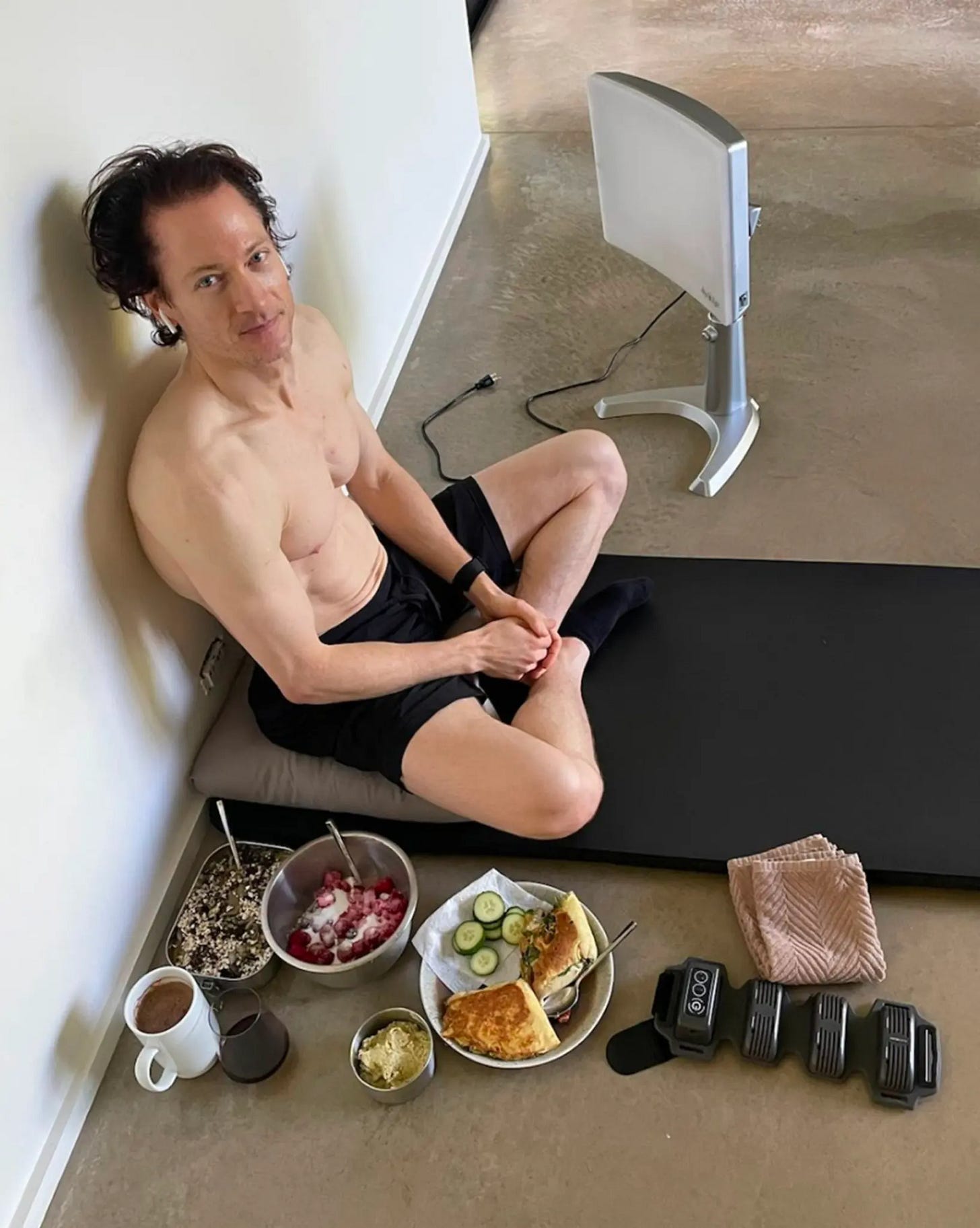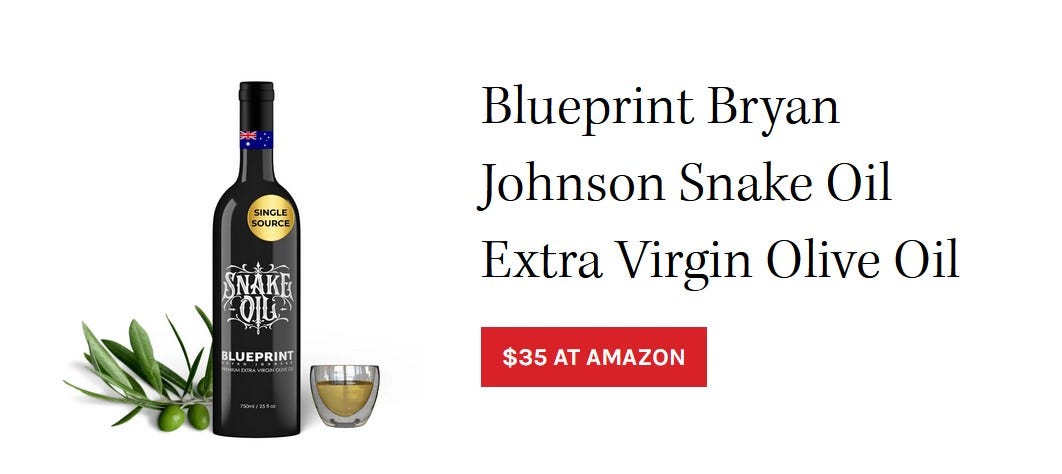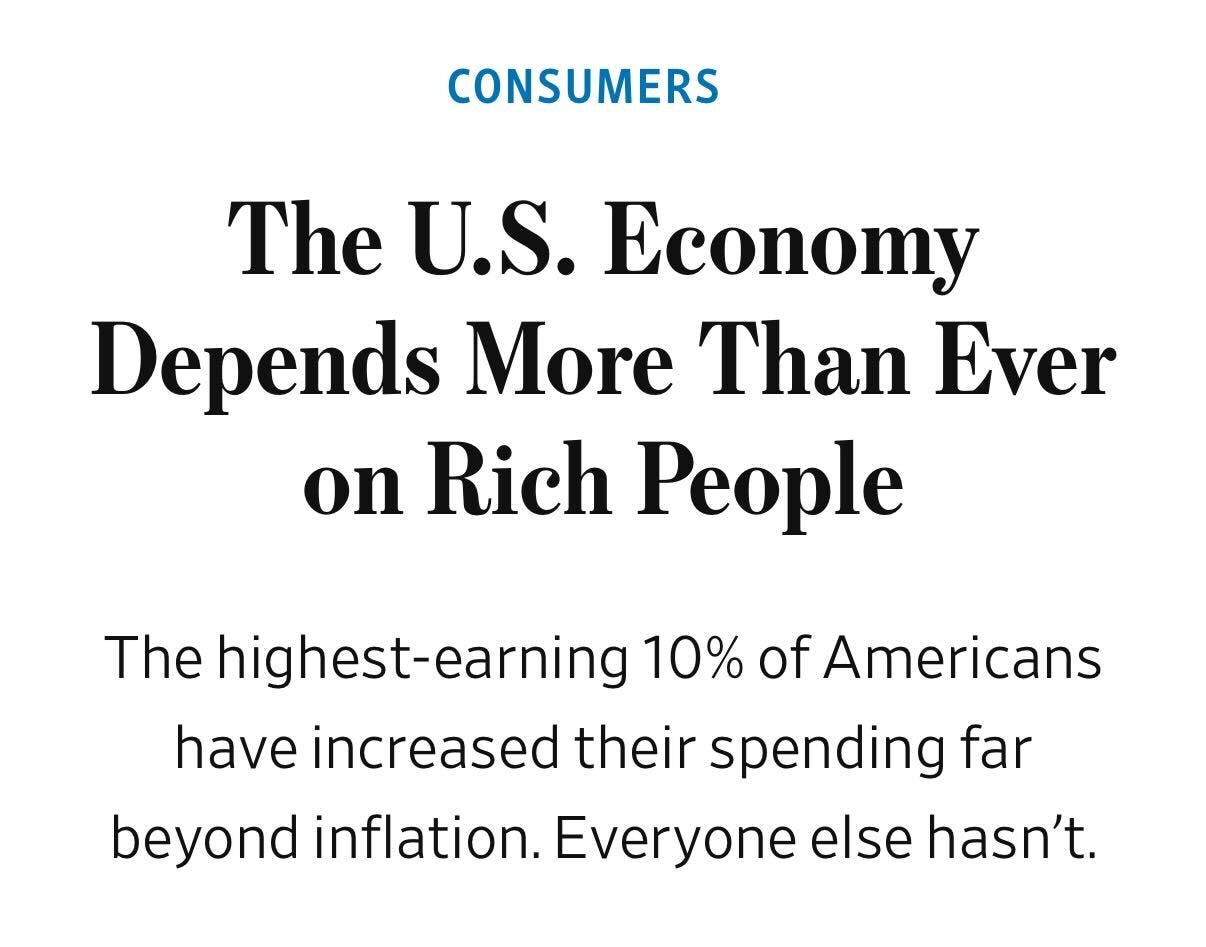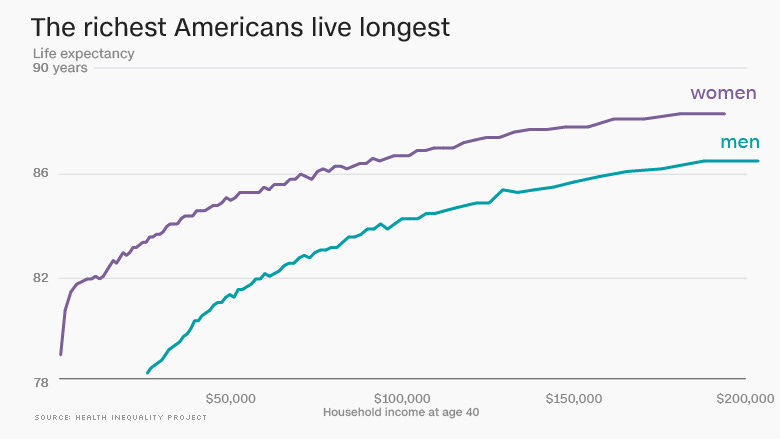Who wants to live forever?
Bryan Johnson and the false promise of immortality
He’s everywhere. He’s a stunt machine. Bryan Johnson is the multi-millionaire whose entire life revolves around wanting to live forever, and letting the whole world know it. His latest stunt is working in his hyperbaric oxygen chamber. He claims that the increased pressure helps the lungs absorb more oxygen, which helps with healing and tissue repair.
Like many of his attention-getting moves, the claim that this will actually help him live longer seems dubious, at best. And, even more so than many of his other well-publicized anti-aging ideas, this one seems miserable. Johnson uploaded a video of himself working on the computer in the chamber with a mask featuring tubes connected to the contraption:
As others have noted, it’s particularly sad to be worth millions and spend your days answering emails in a pressurized chamber. But that appears to be much of Johnson’s life. Aiming to live forever, but doing one unpleasant thing after another in the attempt. For those who are blissfully uninformed, Johnson is also known for injecting his son’s blood, measuring his and his son’s nightly erections, plasma infusions, testing untested supplements on himself and much more. Oh, and he reportedly spends about two million dollars a year on all of this.
But Johnson also makes some money off this whole living forever thing, or, as his branding puts it, the “Don’t Die” thing. He hosts “Don’t Die” summits across the country, and tickets run from $249-$1,799. Maya Vinokour recently attended one of these gatherings and wrote about it for The Nation. One thrust of her article, although she says it more dexterously, is that the whole thing does appear to be somewhat of a flimsy con.
Johnson runs a company called Blueprint that sells prepackaged food and supplements and regimens. The purpose of the “Don’t Die” summits appears to be largely brand building for his company, and as Joseph Everett explains, marketing is really the one thing Johnson is good at. When someone takes dozens of supplements and engages in countless strange, experimental health routines, actually sorting out what works is nearly impossible. And Johnson and his team probably aren’t helping others with their longevity in any profound way.
When Everett looked into the details of the Blueprint method, he found one of Johnson’s collaborators essentially just getting healthier in the way “you would expect someone to improve with nearly any healthy lifestyle plan that includes rigorous exercise, good sleep, supplements for things you’re deficient in and a diet plan that cuts out processed foods.” Likewise, as Vinokour leaves her New York summit experience, she runs into a group which includes a “longevity specialist” who tell her the advice on offer was just basic, and also a waste of their money (they paid for premium tickets).
And yet all of this is just the tip of the iceberg. Where Everett and others correctly dismiss Johnson’s work as unreliable and essentially a big scam (hyping up the virtues of olive oil while selling his special olive oil brand on Amazon and selling a $361 monthly supplement regimen), Vinokour goes further.
In the wake of her “Don’t Die” experience Vinokour explains that Johnson has a “techno-solutionist” approach to health and wellness where you no longer think and simply turn over all decisions to an algorithm. She likens it to philosopher Max Horkheimer’s “instrumental rationality,” a form of reason that never asks “why” but only “how.” This is really where we get down to it. Vinokour lambasts Johnson’s approach as a “meaningless striving toward longevity that never wonders whether an inhumanly long life is even worth pursuing.” She’s right, and I would take her critique even further.
I would say that Johnson teaches us a lot about the entire ruling class. His seemingly genuine desire to live forever, paired with scamming some section of the toiling masses along the way, exemplifies the mentality and activity of the super-rich in this era. And Johnson is super rich. He sold his company Braintree (which owned Venmo) for $800 million in 2013. But instead of relaxing on a private island, he did what most mega-millionaires seem to do, which is find an expensive passion they know nothing about to turn into a business.
Today it’s unclear how much money Blueprint makes. Sure, the supplement plans sell for several hundred a month, but when Johnson launched this subscription service last year only 2,500 people signed up. His summits are also overpriced, but they seemingly count their registrants only in the hundreds and aren’t very frequent. Pair that with Johnson spending $2 million a year trying to cheat death, and it doesn’t seem likely that he’s really making much of a profit here.
No, I think Johnson really wants to live forever. We obviously can’t know the truth of what’s in his head, and heart, but he’s overly rich and continues to go to immense lengths to demonstrate his longevity routines and experiments. He puts his body on the line trying out all manner of possibly life-extending pills and activities. To be clear, he’s not demonstrating that they work, but he is demonstrating his intense commitment to them. Johnson appears to be surrounded by a few snake oil salesmen and viral marketers, but he also exudes true believer.
It appears that developing a following and bringing other people into this longevity stuff is more akin to a religious fanatic proselytizing than it is about making real money. But what’s so striking is that there remains no satisfying answer to the question “recruiting into what?” It all feels meaningless. Johnson and the true immorality devotees spend countless hours trying to extend their lives, without any clear reason as to why we should all devote ourselves to this task. And, notably, they have nothing to offer when it comes to how we ought to spend this one, precious, potentially long life.
Johnson’s existence is ultimately strange, and sad. Living with no purpose other than cheating death isn’t living at all — it’s treading water. He typifies how the people who rule society, and whose wealth and power are only increasing (because they’re deliberately hoarding resources and demolishing democracy to increase their power), have nothing to offer us. Materially they want to take and take and take, and when it comes to meaning and purpose in life they’re deprived and depraved. They seek money for the sake of money, power for the sake of power, and immortality for the sake of immortality.
These people, these rudderless rich, are shaping society more than ever. As inequality is deliberately compounded, the highest-earning 10% of Americans now account for almost 50% of all consumer spending. Of course, the Wall Street Journal frames this fact with “The U.S. Economy Depends More Than Ever on Rich People.”
The truth is that the ruling class is distorting the economy, warping it around them. Instead of a healthy economic system that includes a broad distribution of wealth and the prioritization of human needs, we get a setup where the desires of the rich increasingly shape the economy and society. And it’s detrimental to most people. Resources are spent on barometric chambers and yachts and second homes and unproven, expensive supplements instead of first houses and food and schools and all the many other unmet needs in this country and around the world. And Bryan Johnson collapses this unfortunate reality into one man. As Vinokour writes, “Johnson and his longevity business represent how tech money, scientific half-truths, and optimization culture all converge into a new religion for those wealthy enough to worship at its altar.”
There is a religious nature to it all, but it’s a religion of pointlessness. There’s no clear goal, and there’s no clear benefit to this path. Johnson refers vaguely to the idea of the Singularity from time to time, Ray Kurzweil’s notion that we will merge with machines in some fashion. He apparently wants to live long enough to get there, but when asked more nuanced questions about his outlook Johnson answers with platitudes like, “Don’t Die is meant to say that we have power, we can do something.”
That’s a real quote from an interview with the man, and it has something real to teach us. The lesson isn’t about Johnson’s outlook, it’s about what’s so absent from his outlook. And that’s substance, fulfillment, anything meaningful. When you pose the question of what this life is all about to the richest people on earth, they have no answer. The people guiding and shaping society display to us in multiple ways that if they’re leading us, they’re leading us nowhere. Where does the desire to spend one’s life trying to live forever come from? From the absence of purpose as much as anything.

Johnson ultimately does give us something, one thing. He (unintentionally) provides us with a call to divest from the leadership of men like him. These capitalists have had far too much success in molding society around them, and the result is a world increasingly devoid of meaning where greed and various forms of egomania have become ends unto themselves. In this infinitely rich universe a small number of people and the systems that benefit them have squeezed our lives into the pursuit of productivity and optimization and efficiency, all leading nowhere. These processes have been elevated to deity status by the religion of capitalism. In their proper place each process could improve our lives, but as we become bound by them they steal from us while returning less and less.
It’s time to break free. In a world where the resources we need have already been provided for us, the reality is that the cult of productivity has come to worship excess consumption and unnecessary labor. We need to slow down, not speed up. We need to consume less, not produce more. We don’t need to go to Mars, we don’t need to live forever, what countless people and this precious planet are crying out for is the sorting out of how we live these lives we’re given right here and now. Instead of following the unproven regimens of a strange, waxy snake oil salesman we can and should follow the directives that are known to improve and lengthen life. We should make sure everyone has healthy food, a roof over their head, and good, comprehensive health care.
Only once we’ve organized society to care for all of our basic needs (and a little extra on top) should we debate the importance of beating death. Until then, the Bryan Johnson dream of long life comes with a silent “for the rich” caveat. That dream in truth sounds more like a nightmare where society is stratified not just by wealth but by length of life. In fact, that’s already our reality to a disturbing degree:
This is the world on offer by the ruling class. They live longer lives, and if the status quo persists our timelines will only diverge further. In exchange we get a society with the meaning stripped out, replaced by all-consuming greed and ego that we’re expected to believe are legitimate ends unto themselves. It’s time to reject this absurd and ugly premise. It’s time to resist in every facet of our lives. It’s time to build strong alternatives right here and now, places and institutions where we can find and create real meaning with one another, in relationships and communities and projects that will outlive us all. A society grows great when we plant trees in whose shade we know we’ll never sit, not when we attempt to outlive the trees.









Why does he look like a 65 year old who’s somehow 35?
Your writing, sir, is incredible. This right here:
“A society grows great when we plant trees in whose shade we know they’ll never sit, not when we attempt to outlive the trees.”